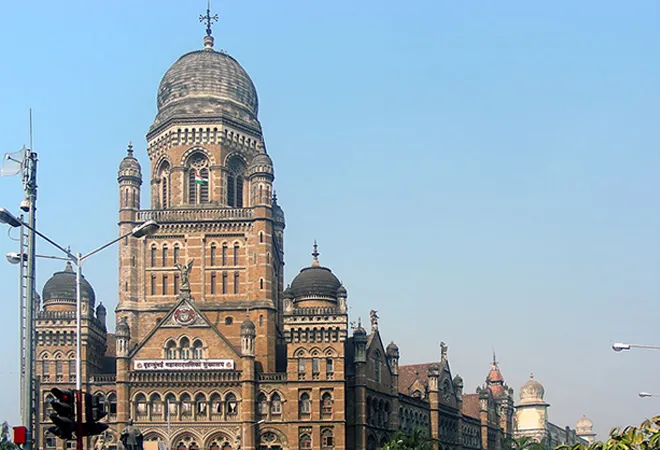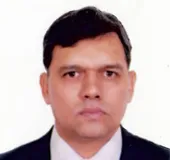
The normal governance construct of municipal corporations in India is a three-layered structure. At the apex is the municipal corporation, comprising all the elected councillors within the geographical area of the city. Each councillor, in addition to representing his or her electoral ward, performs the role of advising and voting on policy. The municipal corporation makes local policies, passes the budget, approves city plans, and decides on issues that relate to the city’s municipal functions. At the next level are various committees, where a group of popularly elected councillors assist the committees in their decision-making process. The most significant committee is the standing committee that exercises financial powers and approves tenders and proposals presented by the municipal administration. Municipal corporations that have populations above three lakhs also have wards committees, empowered to take a certain class of decisions that pertain to electoral wards within their zones. All elected councillors of that zone are members of the wards committees. At the third level is the municipal commissioner (MC) who is the chief executive of the municipal corporation. He is appointed by the state and generally comes from the ranks of the Indian Administrative Service (IAS).
Municipal corporations that have populations above three lakhs also have wards committees, empowered to take a certain class of decisions that pertain to electoral wards within their zones.
What we are discussing here is an unusual situation that seems to have arisen in some municipal corporations of Maharashtra. The Indian
Constitution (74th Amendment) Act provides that a municipality will have a fixed term of five years from the date appointed for its first meeting. Elections to a municipality must be completed before the expiration of the duration of the municipality. The Constitution does not envisage the possibility of an election not being completed before the term of the municipality expires. However, such a situation unfortunately has arisen as the State Election Commission in Maharashtra has not been able to complete elections as stipulated by the Constitution. The Constitution is crystal clear that the elected body in a municipality cannot continue beyond the fixed term of five years. Neither is it feasible that in the event of an election not being completed in time, a vacuum can be allowed to be created in city governance where no one is fully in charge of the affairs of the urban local body. City services that are enablers of life for millions of citizens must be delivered on a daily basis. Therefore, till such time that elections are duly held and completed so that the newly elected councillors can assume duties, some arrangement must be in place that allows functional continuity.
In the past, prior to the existence of the Amendment Act, nothing prevented a state from dissolving a duly elected municipal body before it could complete its tenure. The state could then appoint an administrator. Such action became almost an impossibility after the insertion of the constitutional amendment. Some states that tried were chided by the judiciary. However, in the current unprecedented situation, subsequent to the Amendment Act, the government of Maharashtra has had to appoint
administrators to all such municipal corporations whose elected bodies have either run their full term or will soon complete their period without elections being held. These are Mumbai, Pune, Nagpur, Thane, Pimpri Chinchwad, Nashik, Solapur, Amravati, Akola, and Ulhasnagar. These are amongst the biggest cities in Maharashtra, comprising Mumbai—the largest municipal corporation in the country with a population above 10 million, and Pune and Nagpur above 3 and 2 million respectively. Since the state municipal statutes do not have a provision for appointing an administrator in municipalities, Maharashtra government has amended the
Municipal Act and made the requisite provision for appointing an administrator.
Neither is it feasible that in the event of an election not being completed in time, a vacuum can be allowed to be created in city governance where no one is fully in charge of the affairs of the urban local body.
This unprecedented situation has arisen on account of the web that has got woven around reservations for the other backward classes (OBC). A bill passed by the Maharashtra state legislature has since been cleared by the governor. The statute allows the state legislature to provide a 27 percent quota to OBCs in municipalities. This issue was legislated upon on the basis of an interim report by the State Backward Classes Commission (MSBCC). However, while the state has put the law in place, it still has to pass judicial scrutiny since the
Supreme Court is still to adjudicate on the matter. A point to note is that for once, all political parties, across the entire spectrum, completely agree that they cannot proceed with elections without the reservations for OBCs in place.
A situation, akin to Maharashtra would also obtain in Delhi. Government of India (GoI) has moved to merge the East, North and South municipal corporations, on the eve of elections to these bodies, into a single municipal entity. The State Election Commission has already deferred elections on account of the proposed merger. Quite evidently, an administrator, called here a special officer, would get appointed, soon after
The Delhi Municipal Corporation (Amendment) Bill, 2022 becomes law.
The consequences of the appointment of an administrator are severe. Firstly, it marks the end of the duly elected body in a municipal corporation. All elected councillors seize to be councillors. It, therefore, follows that all popularly constituted committees where councillors were members cease to exist. However, while these popular bodies no longer survive in their popular form, they are statutory bodies and must continue to be in existence to perform their functions. Besides, the municipality must continue to discharge its duties such as making policies, implementing plans and budgets and regulating the municipal affairs of the city.
The administrator combines in a single person the authority of the municipal commissioner, the powers of the statutory committees and those of the municipal corporation.
In such an eventuality, despite the popular character of the city council having been dissolved, the city must carry on in accordance with the character endowed to the municipal corporation by the municipal statute. Hence, a solution has been contrived and it lies in the state using its statutory power to appoint an administrator. The administrator combines in a single person the authority of the municipal commissioner, the powers of the statutory committees and those of the municipal corporation. All powers, thereby, are concentrated in the hands of a solitary individual. However, in the light of the statute, the individual takes three different ‘avatars’. In the capacity of a municipal commissioner, the administrator disposes of matters that statutorily lie within the competence of the municipal commissioner. In the ‘avatar’ of a committee, the administrator sends proposals to the committee in the capacity of MC, but approves them in the capacity of the committee. These proposals comprise those that are not within the competence of the MC but of the committee. In the third ‘avatar’ as the municipal corporation, the administrator sends proposals to it first, in the capacity of municipal commissioner and second, in the capacity of the committee, if so mandated and then approves the proposal in the capacity of the municipal corporation.
The sum and substance of this sweeping change is that the citizens residing within the jurisdiction of a city council where an administrator is appointed lose their voice through the elected representatives they had chosen. This arrangement, apart from wiping off the popular character of a local body and putting all authority of the council in an administrator, brings in the state as the single, omnipresent, and omnipotent power in municipal affairs. Whereas the overall authority of the state in municipal affairs was at all times beyond dispute, the absence of a popular body in the municipalities makes the state’s authority untrammelled and absolute.
One can understand if this is for a brief, unavoidable period due to certain exigencies beyond human control. However, it would be far-fetched to state that the matter of OBC reservation falls under the category of ‘force majeure’. It clearly shows how fragile local empowerment is and how easily it can be trifled with.
The views expressed above belong to the author(s). ORF research and analyses now available on Telegram! Click here to access our curated content — blogs, longforms and interviews.



 The normal governance construct of municipal corporations in India is a three-layered structure. At the apex is the municipal corporation, comprising all the elected councillors within the geographical area of the city. Each councillor, in addition to representing his or her electoral ward, performs the role of advising and voting on policy. The municipal corporation makes local policies, passes the budget, approves city plans, and decides on issues that relate to the city’s municipal functions. At the next level are various committees, where a group of popularly elected councillors assist the committees in their decision-making process. The most significant committee is the standing committee that exercises financial powers and approves tenders and proposals presented by the municipal administration. Municipal corporations that have populations above three lakhs also have wards committees, empowered to take a certain class of decisions that pertain to electoral wards within their zones. All elected councillors of that zone are members of the wards committees. At the third level is the municipal commissioner (MC) who is the chief executive of the municipal corporation. He is appointed by the state and generally comes from the ranks of the Indian Administrative Service (IAS).
The normal governance construct of municipal corporations in India is a three-layered structure. At the apex is the municipal corporation, comprising all the elected councillors within the geographical area of the city. Each councillor, in addition to representing his or her electoral ward, performs the role of advising and voting on policy. The municipal corporation makes local policies, passes the budget, approves city plans, and decides on issues that relate to the city’s municipal functions. At the next level are various committees, where a group of popularly elected councillors assist the committees in their decision-making process. The most significant committee is the standing committee that exercises financial powers and approves tenders and proposals presented by the municipal administration. Municipal corporations that have populations above three lakhs also have wards committees, empowered to take a certain class of decisions that pertain to electoral wards within their zones. All elected councillors of that zone are members of the wards committees. At the third level is the municipal commissioner (MC) who is the chief executive of the municipal corporation. He is appointed by the state and generally comes from the ranks of the Indian Administrative Service (IAS).
 PREV
PREV


